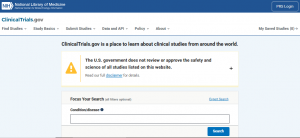
2. On the PRS log-in page, in the Organization field, enter “UConnHealth” (no spaces) if your account was created under UConn Health or “UConn” if your account was created under UConn.
3. Click on the blue “Create New Record” button on the far right of the page. The system will walk you through the creation of the record. Data entered on previous pages will be retained so that you can return to complete the record at a later date.
The person who creates the record is the “Record Owner.” The Record Owner may be the Principal Investigator (PI) or someone designated by the PI to create/update the record on his/her behalf. The PI must perform the final review and approval of the record and each subsequent update in the PRS. The PI is responsible for ensuring that accurate information about the trial is entered and that updates to the record are completed in a timely manner (see table below for specific deadlines).
Complete the below fields as follows:
-
-
- Organization’s Unique Protocol ID: Enter the IRB number.
- Secondary IDs: Enter the grant number.
- Record Verification Date: Enter the month and year in which you are completing the record. This field will need to be updated each time you update the record after it is registered.
- Primary Completion Date: Enter the anticipated final data collection date, specifically regarding the Primary Outcome Measure.
- Responsible Party: Select the Principal Investigator from the drop-down menu.
- Collaborators: Add any other organizations providing support, including funding, design, implementation, data analysis and reporting.
-
For studies reviewed by UConn Health:
-
-
- Board Name: UConn Health IRB
- Board Affiliation: UConn Health
- Board Contact phone and e-mail: 860.679.8729; irb@uchc.edu
- Board Contact Address: UConn Health IRB, 263 Farmington Avenue, Farmington, CT 06030-1511
-
For studies reviewed by UConn Storrs and Regional Campuses:
-
-
- Board Name: UConn IRB
- Board Affiliation: UConn
- Board Contact phone and e-mail: 860.486.0986; irb@uconn.edu
- Board Contact Address: UConn IRB, 438 Whitney Road Extension, Unit 1246, Storrs, CT 06269
-
The Final Rule dictates that ClinicalTrials.gov record fields are updated on the below schedule:
| Data Field | Deadline for Updating (i.e., not later than the specified date) |
|---|---|
| Study Start Date | 30 calendar days after the first subject is enrolled (if the first human subject was not enrolled at the time of registration). |
| Intervention Name(s) | 30 calendar days after a nonproprietary name is established. |
| Availability of Expanded Access | 30 calendar days after expanded access becomes available (if available after registration); and 30 calendar days after an NCT number is assigned to a newly created expanded access record. |
| Expanded Access Status | 30 calendar days after a change in the availability of expanded access. |
| Expanded Access Type | 30 calendar days after a change in the type(s) of available expanded access. |
| Overall Recruitment Status | 30 calendar days after a change in overall recruitment status. If Overall Recruitment Status is changed to “suspended,” “terminated,” or “withdrawn,” the Why Study Stopped data element must be submitted at the time the update is made. |
| Individual Site Status | 30 calendar days after a change in status of any individual site. |
| Human Subjects Protection Review Board Status | 30 calendar days after a change in status. |
| Primary Completion Date | 30 calendar days after the clinical trial reaches its actual primary completion date. |
| Enrollment | At the time the primary completion date is changed to “actual,” the actual number of participants enrolled must be submitted. |
| Study Completion Date | 30 calendar days after the clinical trial reaches its actual study completion date. |
| Responsible Party, by Official Title | 30 calendar days after a change in the responsible party or the official title of the responsible party. |
| Responsible Party Contact Information | 30 calendar days after a change in the responsible party or the contact information for the responsible party. |
| Device Product Not Approved or Cleared by U.S. FDA | 15 calendar days after a change in approval or clearance status has occurred. |
| Device Product Not Approved or Cleared by U.S. FDA | 15 calendar days after a change in approval or clearance status has occurred. |
| Record Verification Date | Any time the responsible party reviews the complete set of submitted clinical trial information for accuracy and not less than every 12 months, even if no other updated information is submitted at that time. |

 We have coined our initiative to modernize our Enterprise Research IT systems and automate research administration functions the electronic Research Administration, or eRA. We have created the eRA Help Desk to assist you with your questions and technical problems. The eRA Help Desk’s contact information is listed below.
We have coined our initiative to modernize our Enterprise Research IT systems and automate research administration functions the electronic Research Administration, or eRA. We have created the eRA Help Desk to assist you with your questions and technical problems. The eRA Help Desk’s contact information is listed below. Pamir Alpay
Pamir Alpay



